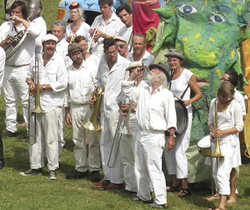
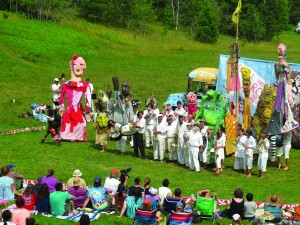
by Natalie Hormilla
GLOVER — “The assessment is more important for the participants than for me.”
This is what Peter Schumann answers when asked what he thinks of Bread and Puppet Theater turning half a century old this summer.
Mr. Schumann has been the artistic director, or whatever you want to call him, of the theater since he founded it in New York City in 1963.
Bread and Puppet is often referred to as political theater. The company, comprised of a small cast of core employees who are complemented by a large set of mostly seasonal volunteers, puts on shows with strong, political themes, usually in protest of capitalism, corporatism, and imperialism. These shows, which Bread and Puppet refers to as “the circus,” happen here in Glover every Sunday for a couple months in summer. After each performance, audience members are treated to homemade bread, baked by Mr. Schumann himself.
Bread and Puppet also hosts a variety of other events at the Bread and Puppet farm — sometimes talks, sometimes shape-note sings, sometimes art exhibits — but it’s the Sunday circuses for which they’re best known.
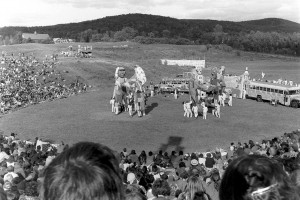
Local people, even if they’ve never been to the circus, will recognize Bread and Puppet’s trademark larger-than-life, papier-mâché puppets, some worn by people on stilts, which appear regularly in community parades. The company also tours around the world, appearing at events like festivals and rock concerts.
The Bread and Puppet Museum, housed in an old barn on the company’s farm, has long been a site frequented by visitors and natives of the Northeast Kingdom. The museum displays many of the old puppets from shows past, and has a small area where Bread and Puppet’s trademark posters, prints, and calendars may be purchased.
Bread and Puppet has been based here in Glover for most of its existence, but an eye to the whole world has informed its performances since the very beginning.
Mr. Schumann said he chooses the Bread and Puppet show themes using “things we’re totally upset by. We don’t choose them, they choose us.”
He says he focuses on issues for which there are no other outlets.
“You meet people who are so frustrated with the state of the world,” he said. “But there’s no outlet for them.”
He says the circus themes are the “result of the stupid New York Times, or whatever, these miserable news organs. What they don’t print, or talk about, is what we do, or what they only mention — things that need more mentioning.”
For an example, Mr. Schumann points to an edition of the New York Times from this past April. He says that the front page read something like, “Boston bomb outrage,” and that a story about the destruction of an Afghan village by U.S. drones was buried on page 35. He said the village was seen as just “collateral damage.”
Bread and Puppet circuses often refer to many different world incidents — the performance on July 28 paid respect to Operation Enduring Freedom, including the number of people killed, and a solo dance for Trayvon Martin, involving a black flag. Those acts were part of the “Total This and That Circus, Part One: This, Part Two: That,” which is the theme for Bread and Puppet’s fiftieth year.
“People come for obscure reasons, not the normal theater reasons, getting your money’s worth of giggles and tears. We don’t provide that. We don’t feel obliged,” Mr. Schumann said.
“It’s bread and puppet, and we mean that. The puppetry is to create the situation to share the bread, because without that you couldn’t persuade them, in a capitalist country, to come and eat bread. They’d be too skeptical.
“What we’re trying to sell is zero value,” he said, in reference to the free bread. “And that’s hard to sell, so we must make puppetry. It’s a trick.”
A bit of history
“The bread came before the theater,” said Elka Schumann, in an interview on the Bread and Puppet farm.
Ms. Schumann has been married to Mr. Schumann a long time, and is deeply involved in Bread and Puppet, and particularly in its music.
“Peter is the founder, the artist, and the director,” she said. “I gave support and criticism, I’ve nagged, and done all those things wives are famous for.”
Ms. Schumann said the famous Bread and Puppet bread is a Schumann family recipe.
“Peter learned it from his mom, sourdough rye. She baked it for the family until her death at over 100.”
She said the original recipe is pure rye, sourdough, salt and water. The original, all-rye bread used to be served to members of the circus audience. “But Peter kept noticing bread in the garbage with one bite taken out.”
So he created a recipe that is half rye berries and half whole-wheat flour.
“It’s more generally liked,” she said.
She said the rye berries are still ground by hand on the farm, using a mill from England.
The bread is baked in ovens built in a Quebecois style, with clay splashed on bent branches. “Sort of like a loosely woven basket,” she said. “It’s just a really simple, great place to bake over 100 loaves at a time.”
She said that Mr. Schumann bakes bread about four times per week in the summer. The bread is served at the circuses, but it’s also sold at some locations, and it is devoured by the puppeteers at the farm.
The Bread and Puppet bread is always served with aioli, which they started doing after encountering it while on tour in southern France. Ms. Schumann said the aioli is just mashed garlic with oil dribbled in.
But long before aioli and hundreds of loaves of bread at a time, came the puppet shows in New York City.
Mr. and Ms. Schumann lived in the Lower East Side in the early 1960s. They had a loft on Delancey Street, within walking distance of their home, and it was there that Mr. Schumann began his puppet career.
Ms. Schumann said that Mr. Schumann had dreamed up a new sort of dance as a high school student in his native Germany. The dance would include ordinary gestures, like walking and then stopping, done by a group of people all very focused on what they were doing.
“There was no interest in this in Germany, in the ’50s, in something so strange,” she said.
But then they came to New York.
“In New York City he met this whole world of avant-garde artists,” Ms. Schumann said. “Then he went to a puppet festival of the Puppeteers of America, who had a very orthodox style. But there was a group there from Sicily with marionettes with simple technology, which Peter liked. Their plays were retellings of the Crusades. It put puppetry in a totally different light.”
That was 1961.
Mr. Schumann would put on puppet shows for kids in his Delancey Street loft. Before long, he moved on to bigger puppets.
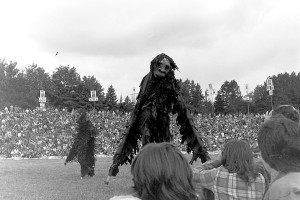
“And then right away he made huge masks, and had the puppeteers inside the whole figures, and then later they got so big they needed two people — one person manipulating and one inside,” Ms. Schumann said.
“In the U.S., in the early ’60s, there was a real openness in the air to strange kinds of theater,” Ms. Schumann said. “There was an audience for those things.”
“There were immediately volunteers who wanted to express political feelings, who wanted to do more than attend meetings and hold a sign.”
Bread and Puppet became known for protest against the Vietnam War. Their first tour abroad was for the piece, “Fire,” which was about three Americans who set themselves on fire in protest to the war. Bread and Puppet performed the piece in their loft and in a New York City church.
“A French talent scout saw it and invited Bread and Puppet to Nancy, France, in 1968, for a big festival,” Ms. Schumann said.
“We were somehow riding this wave of protest, anti-war feelings, general turmoil of society. Things were moving away from talking head monologue in theater, to spectacle and audience participation.”
Bread and Puppet’s big puppets were a hit, and the company was invited to many big festivals from there. Ms. Schumann said that they traveled to Europe several times per year over the next decade to perform.
In the early ’70s, Goddard College in Plainfield invited Bread and Puppet to be the school’s theater in residence. The Schumanns stayed at a nearby farm, the Cate Farm, during the four-year appointment.
The invitation was a welcome one. The Schumanns had been living in New York City with their five children, and had been longing for the countryside.
“It felt so good to have a home in the country, and to have gardens,” Ms. Schumann said.
Bread and Puppet’s stop at Goddard was an important one. It was there, in 1974, that they performed the first of their annual “Our Domestic Resurrection Circus.”
“That was the prototype,” Ms. Schumann said.
Different versions of that circus would be performed from then on, every summer, until 1998.
But the circus would not live on in Plainfield. “We were there until the college politely implied that this was temporary faculty housing,” Ms. Schumann said. They paid no rent and made no salary, “but had a beautiful facility,” she said.
As luck would have it, Ms. Schumann’s parents had recently bought the old Dopp farm in Glover. Restoration of old buildings turned out to be more than they bargained for, so they let their daughter and son-in-law move onto the farm with their family. It was there that the circus, which became a major two-day event, would continue.
The Domestic Resurrection circus was the result of two to four months of work each summer, Ms. Schumann said. The circuses were performed by the core company and many volunteers, sometimes off the street.
The Glover farm had a ready-made amphitheater in which the circuses were, and still are, performed. The space was originally a gravel pit.
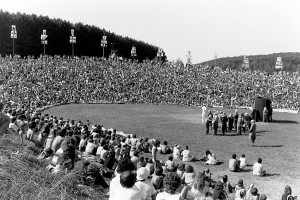
“Scores of trucks would take gravel away, and it went to I-91,” Ms. Schumann said. “It was supposed to be filled back in, but Peter said, ‘don’t touch a thing!’ It was perfect for the circuses.”
The first circus in Glover was in 1975, the same year the Bread and Puppet Museum opened.
Over the years, the Bread and Puppet circus, held in late August, would become a major attraction for people from all over the world.
The circus
The annual Our Domestic Resurrection Circus was something like an allegorical play dealing with good versus evil, involving giant papier-mâché puppets, stilts, and a big brass band.
It was a show where you would see Governor Madeline Kunin in the crowd, or Congressman Bernie Sanders in the performance itself, on election years.
The circus was a weekend event which drew crowds of tens of thousands to a town in which fewer than one thousand people resided.
This meant many cars, and many tents, stationed near the Bread and Puppet farm, located off Route 122.
A Chronicle article from August 17, 1983, reads that the circus “left a line of parked cars that stretched 11 miles along routes 122 and 16 in Glover, and filled several hayfields and gravel pits that were pressed into weekend service as parking lots. Because the circus is free, nobody knows how many people came. But Deputy Sheriff Ray Young of Glover measured the miles of cars, made some calculations, and estimated crowds of 15,000 on both Saturday and Sunday.”
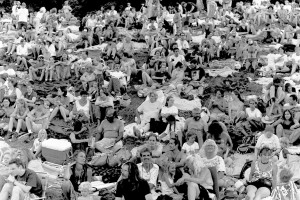
By 1998, the crowd estimate reached 30,000.
The people brought with them traffic, but they also brought business.
“Oh mister, talk about busy,” said Jimmy Currier, who owns Currier’s Quality Market on Route 16 in Glover, a short distance down the road from Bread and Puppet.
“That was the busiest day of the year, when the old circuses were on for a weekend, years ago. It was unreal.
“If a show was out, and you came into Currier’s, all you could see was heads,” he said. “And on the street there were so many people.”
He said that Currier’s would get a tractor-trailer of just ice for the show goers, along with plenty of beer, wine, fruit, and produce for salads.
“They weren’t the bologna type.”
“If I remember, the juice section would get wiped out, tons of water, cases of water. Sold it all. We would have somebody pumping gas,” he said.
“The Busy Bee, the little diner across the street, Edna Chamberlain ran it, and she was right out straight,” he said. “Course you got to remember there were a lot of food booths, but Edna was very busy.”
Mr. Currier said that he liked the excitement the circus brought. Not everyone in town shared this sentiment.
“I do know there were some people in town that did not like it. I could hear grumbling,” he said. “I never discussed it with anybody, but I could hear grumbling. Some did not like it. Flat out right.”
Mr. Currier said he never had any issues in the store, even with so many strangers around.
“The Bread and Puppet people were really docile,” he said. “Always courteous, never wise.”
“I don’t really think there was ever any trouble, ever, until the wrong people started coming,” he said.
“It was always a very family-oriented environment, and even to the end, the environment on the farm itself was very family friendly,” said Randy Williams, an EMT who was captain of the Glover Ambulance Squad when the big circuses were still around. “But the campgrounds did take on a life of their own.”
“All the fields surrounding Bread and Puppet were camping areas,” Mr. Williams said. “Even the gravel pit, Thompson’s gravel pit, back behind Bread and Puppet, that was a big parking area.”
Mr. Williams helped treat many people for a variety of issues during the circus weekends.
“We were getting like ten ambulance calls a day, which for us was overwhelming, and in fact we’d have to call in Barton ambulance to take some of the calls,” he said. “We only had one ambulance, and we were being run ragged, because it was 24/7 with all the campers.”
Eventually, the Glover Ambulance Squad set up a tent right in the Bread and Puppet field.
“Over a period of several years, this tent escalated in size, and we eventually put up an old army tent that was, I believe, 30 by 50 or something like that,” he said. “It really for all intents and purposes was a MASH unit tent.”
“And we got a lot of visits. Over the weekend, we would treat over 100 people,” he said. “I mean most of it was just real benign stuff, like heat problems.”
Mr. Williams even went around to all the campground areas and lined up landing zones for the Dartmouth-Hitchcock helicopter, in the event of a major emergency, like a big fire.
“We never had to use that service, but it just illustrates how elaborate our setup was.”
Over the years, the number of people who showed up just to party grew. Some people would need to be treated for drinking too much, or overdosing on drugs.
“We had people that had never done LSD before, and somebody gave them some down at the campground and they came wandering up to the field and had no earthly idea where they were, and they got freaked out because they didn’t understand what was happening to their body and their mind,” he said. “We’d take them to the tent, let them lay down for a couple hours, and generally they’d be fine.”
“Part of the reason that that evolved, we understand from talking to people that were doing this, was they saw Bread and Puppet as a fun thing to do between say a Phish concert in Boston and a Grateful Dead concert in Montreal. They would stop over for the weekend and party at Bread and Puppet, and many of them never even went up to see what Bread and Puppet was. They just paid their money and camped and partied, and they ended up dancing in the fires, and eating the local mushrooms which caused some major health issues, so it was a whole other scene when all that started to happen.”
Mr. Williams said he had several patients who gave that explanation when asked why they were at Bread and Puppet.
“Peter had been concerned about it for years, that the traffic was bad, dogs were an issue, there were all kinds of things that started to progress,” said Betsy Day, who is also an EMT who worked at the Bread and Puppet circuses. “And every year they tried to solve it in a different way, and every year the crowd got bigger.”
The final weekend-long Our Domestic Resurrection Circus was held in 1998. That year, a man named Michael Sarazin died after having been punched in the head at one of the nearby campgrounds.
Some people blamed alcohol and drugs, some people blamed Phish, some people blamed bad luck, but one thing was for sure — it spelled the end of the major circus.
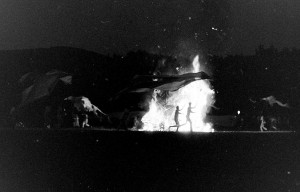
In an announcement in the Chronicle on August 19, 1998, Mr. Schumann said that Mr. Sarazin’s death “makes the continuation of the event impossible.”
Bread and Puppet would continue to give smaller shows throughout the ensuing summers.
“I’ve always thought very highly of Peter for calling it, because of that,” said Mr. Williams. “Because you had to remember that the one weekend circus pageant was their major fund-raiser for the year. But it was obviously, philosophically, the right thing to do.”
Mr. Williams also pointed out that many other people benefited financially from the circuses.
“It was a huge financial weekend for Jim Currier, the Busy Bee, and every business within a 20-mile radius probably,” he said. “There were no places to stay other than the campgrounds, with what meager pickings there are here for lodging, but the farmers certainly made tons of money, and so when it went away of course that depleted that source of income as well.”
“There were of course factions of people that were disgruntled about the whole thing, but there was no denying that it was an economic boon to the community,” he said.
He also said the Glover fire department would make thousands of dollars each year through a roadside coin drop.
Mr. Williams said the Bread and Puppet circuses gave the members of the ambulance squad valuable experience.
“You got a volume of varied calls, and you had to use your training to deal with it, and we did a great job doing that,” he said.
“It gave us, us on the ambulance squad, a lot of experience that we would not have had, and therefore a real sense of pride that we were able to get it done.”
Bread and Puppet in the world
“The theater has given so much to the community,” said Linda Wells, who has retired after 28 years as librarian of the Craftsbury Public Library.
She said Bread and Puppet helped when the library needed a new building. “Bread and Puppet did a big show in the high school gym, and all the proceeds went to building the Craftsbury library, which was very kind.”
She said that Bread and Puppet works with Upward Bound, a college-preparatory program for kids who will be the first in their families to attend a university.
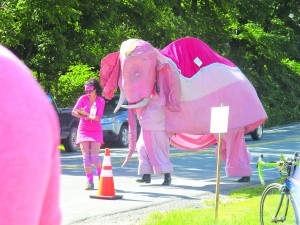
Bread and Puppet also performs for people in Independence Day parades, at Old Home days, and at libraries and nursing homes.
“The tradition of summer parades are a great chance to bring these puppets to people who wouldn’t dream of coming to shows or the museum,” Ms. Schumann said. “It’s a way to bring theater to the community.”
Ms. Wells also said that Bread and Puppet helps teach people how to be heard.
“When there’s an issue we care about, or is disturbing to us, they will come and help us with parading and protest,” she said. “They’ve taught us a lot about how to speak out. That can be very hard in a small community, to find a voice for that.”
Ms. Wells has been involved with Bread and Puppet since 1977, “before the circuses were even big.”
She used to perform in the big weekend circuses.
“It was fabulous. A little — what’s the word? — nerve-wracking, in front of that many people, to get your cues right. You’d sleep for about two weeks after. It was intense.”
Ms. Wells said that both her children were inspired to become musicians thanks to Bread and Puppet. “No question about it.”
Her son played violin for a long time after seeing someone in Bread and Puppet with one; he’s since moved on to guitar. Her daughter plays cello in a band called Anodyne Gearhart, based in Portland, Oregon. Her kids were involved with the Bread and Puppet Theater right until college.
“It’s had a huge influence on us, in all aspects, and each one of us has been influenced strongly by the theater, in a good way.”
She said her family has made friendships from all over the world through the theater.
“We started coming here because we felt very akin to what the stories were about, and things going on in the world.”
Amy Trompetter of Rosendale, New York, has been involved with Bread and Puppet since 1968. She grew up in Ohio, attended Berkeley, and found Bread and Puppet in New York.
“It was exactly what I was looking for,” she said.
She has a theater company in Rosendale called Redwing Blackbird which is “heavily influenced by building giant puppets, backdrops, and activism.”
Ms. Trompetter said that Bread and Puppet is “a model for living outside the compromises of work life in the U.S. The corporate model is dominant. People spend their lives doing something they don’t want to do. Bread and Puppet says it’s possible to have integrity in what you do. To live simply, without needing.”
Ms. Trompetter is one of the many puppeteers who arrange their lives to be able to live in Glover for the summer to perform with the theater.
“It’s like my tribe,” she said. “When I’m in Rosendale, I’m convincing people that what we’re doing is effective and working. But when I’m here, we’re all on the same track.”
“The wish to live differently is embodied in doing the theater,” she said. “It gives us spirit and happiness, which is the kind of life we’re wanting.”
The Bread and Puppet farm teems with activity in summer. Drop by on a random weekday, and you’ll find a group of maybe 20 people singing shape-note songs beneath the shade of a tree. Some are out back behind the shed, painting signs or sculpting papier-mâché. Some are inside preparing the lunch that everyone will share at noon. Some are out in the print shop painting the iris and rose prints that adorn the houses of many, whether they’ve been to a Bread and Puppet show or not. Mr. Schumann can be found in the thick of it, working on a giant mask, and later, doling out bread to his volunteers.
Everybody is doing something, working on the same thing in different ways. And yet the energy is calm. There is no need to give orders. The schedule is scratched onto a chalkboard that sits near the lunch hut. The different hours of the day list tasks like “paper mache,” “turkeys,” “stilt rehearsal,” and “outhouse gallery walk.”
Ms. Schumann said that some people refer to the farm as “a bubble.”
“We’ve been so enormously lucky to find this place and also the people who give creatively and who organize, which is very important,” she said. “The days are so full.”
Bread and Puppet has few year-round employees. The rest are either volunteers or seasonal employees, many of whom travel from all over the world to work in Glover for the summer.
Katherine Nook, a Utah native, is a Bread and Puppet staff member and lives on the Glover farm year-round. She is the resident puppeteer, which means she does everything from performing on tour to feeding the pigs on the farm in the morning.
She also helps organize the team of summer interns who descend upon Glover every summer. She said they get more and more letters every year from people from all over the world who want to be an intern at Bread and Puppet.
“One hundred and six people wrote letters to be interns this year. There were only 35 spots, though,” she said.
Ms. Schumann said that, in summer, there are 40 to 60 people living on the Bread and Puppet farm for a couple months. They mostly stay in tents and defunct touring buses.
“They come for two months,” she said. “They learn to do it all — print, wash dishes, mow the lawn, rehearse. We encourage people to do their own little shows before the big circus.”
Ms. Schumann said that many people who have traveled to Glover to work with the theater have bought land in the area to live permanently.
Linda Elbow of West Glover, who is a native of New Jersey, began working with Bread and Puppet in the ’70s. At the time, she was working in theater costuming at Goddard.
“When Bread and Puppet was based at Cate Farm, they would come into that theater to perform before going out on the road, and so I was spying on them,” she said. “And I was also very interested in what Peter was talking about, like scale, depth, and sound. But I was totally terrified of getting to know those people, because they were like wild European hippies in my mind. But I just got to know them better, and I decided they weren’t so wild after all.”
These days, she’s the business manager for the theater, which means she handles the money and books the shows on tour.
Bread and Puppet is one of the oldest nonprofit theaters in the country. It does not seek out grants of any type, which Ms. Elbow said is important.
“We just want to be free,” she said. “We don’t want to have any restrictions on what we’re doing.”
Ms. Elbow acknowledged that some Bread and Puppet performances most likely happen because of grant funding, which is sometimes from the government.
“When we perform at a local school here in Vermont, chances are they got their funding from a state council through the government, and that probably happens when we go to colleges, too,” she said. “But we do not apply for these things directly at all.”
Ms. Elbow said that a mix of donations, payments for touring shows, and sales from the print shop, along with countless volunteer hours, are what make it possible for Bread and Puppet to function.
“We do get donations throughout the year,” she said. “Anything from $10 to like a $1,000. One family gives $10,000 each year. That helps.”
“We try to be very low budget,” she said. The paid puppeteers make very modest salaries, she said, and the theater company provides them with room and board.
Bread and Puppet also asks to be both housed and fed when invited on tour.
“We usually stay in local homes. I can remember sleeping on a church floor one time when I was touring with the company.”
A single afternoon on the Bread and Puppet farm revealed several ways in which the company pinches pennies.
Mr. Schumann said that, not counting paint, Bread and Puppet has only spent about $30 on its papier-mâché supplies over the last 35 years.
The company has been using the same batch of cornstarch — “either a half a ton, or a ton,” he couldn’t remember — in its papier-mâché puppets for over 35 years, after buying a big load in the late ’70s.
“It was a nice deal,” Mr. Schumann said. “We share it with the mice.”
He also said most of the cardboard used for papier-mâché is from a load of scraps he received in the late ’70s from a friend who worked at a cardboard factory. Bread and Puppet continues to add to that supply, picking up cardboard from furniture and appliance stores for free.
“That’s our religion — ‘cheapicity,’ it’s called. I don’t know which Gods,” he said. “Dozens, probably.”
Mr. Schumann acknowledged that volunteer work is a major force at Bread and Puppet.
“We can’t afford to hire,” he said.
Providing entertainment to everyone, even if they don’t have any money, is a focus of the theater.
“We performed in a park in downtown Richmond, Virginia, and most of the audience lived in the park, homeless on benches,” said Noah Harrell, who works with Bread and Puppet in summer. “And they went there for the bread, and they saw the show.
“They would stick around afterwards and eat bread and mingle with the other people who didn’t live in the park,” he said. “When would those two people spend time together? And share bread together?”
Mr. Harrell said that Bread and Puppet tours all over the world in a variety of venues. He said the theater did a show in Tuscany, Italy, last month, where Bread and Puppet was the highlight performer of a big festival. But the theater has also worked in Palestine, and in Haiti after the massive earthquake in 2010.
“Usually when we tour abroad it’s organizations that have enough money to bring us. Unfortunately, that’s the reality of it,” he said. “Often the groups that would benefit most from the Bread and Puppet style of performance aren’t necessarily the ones that could afford to bring us, so there are a lot of festivals, puppetry festivals, performance festivals, music festivals.”
When he’s not in Glover, Mr. Harrell runs a small theater company of his own in his native North Carolina called the Rural Academy Theater. He said Rural Academy provides horse-drawn theater that tours mostly in the southeast.
Mr. Harrell studied theater and has a master’s degree in directing.
“I often say that to join Bread and Puppet, I had to unlearn that training,” he said.
He said his time at Bread and Puppet has informed his company’s work.
“It’s hard not to see the influence,” he said. “I’ve learned at Bread and Puppet not to make things too carefully, and that’s not a criticism of Bread and Puppet at all. One of the strengths of Bread and Puppet is leaving something for the audience to do, not finishing a visual piece completely, giving a hint at something and letting the audience participate.
“It’s not a polar opposite to traditional, Western theater,” he said, of the Bread and Puppet style. “But there’s a lot more emphasis on the group, and the strength of a group of performers, as opposed to individual performers.”
He said it can sometimes be difficult for an actor to let go of the ego of being the solo performer, “but the effect can be powerful.”
Bread and Puppet’s work is well known in the arts world. The theater has received numerous awards, including the Obie Lifetime Achievement Award, in 1984, which is given by the New York City newspaper The Village Voice, for off-Broadway productions. That year Mr. Schumann also accepted the Erasmus Prize, a major arts award in Europe. Other past Erasmus winners include Charlie Chaplin, Ingmar Bergman, and Peter Sellars.
“Bread and Puppet has been around for 50 years, so the name is familiar enough and the style has become familiar enough to a lot of people that that reputation alone can sometimes be what brings us on tour,” Mr. Harrell said. “But at the same time, in the U.S., even in New England, people have never seen us before, and that’s exciting. Bread and Puppet isn’t mainstream. There’s a big following and a big family, but it’s still somewhat under the radar.”
“Some people come for the theater and get the bread, some people come for the bread and get the theater, and the message is somewhere in the middle in there,” he said.
The future
Mr. Schumann will turn 80 years old next year. When asked if he envisions a future for Bread and Puppet beyond his own life, he surprised this reporter by giving a direct answer.
“We’re talking about that a lot, naturally,” he said. “It’s complicated — the farm, the agriculture, the living situation, the print shop, the storage, which has way more than the museum.”
“Some of Bread and Puppet is continuable, and some not,” he said. “It’s a problem. I have no answer for this.”
As a member of the core company, Ms. Elbow has been working on the issue some.
“About five years ago, we created a new board, to talk about what’s going to happen when Peter’s not here,” she said. “Do we want to tour? Perform here? Do we want to forget about it? No major decisions have been made.”
Ms. Elbow said that Mr. Schumann is the company’s artistic director. “And that’s the only director we have.
“He thinks up these ideas. Sometimes he even comes down to us with a script or with a good outline of ideas. Other times he has vaguer ideas, like ‘go out to the shed, find some stuff, start having some conversations, and tell me what you got,’” she said.
“Sometimes we’re successful, sometimes we’re not. Sometimes the best ideas have come up when we’ve broken for lunch. Sometimes it comes from fooling around and Peter says, ‘yes, yes, that’s a good idea,’ so it depends on the resident company and all the interns we have.”
She said that though Bread and Puppet’s cast of workers all collaborate on the shows, Mr. Schumann is, ultimately, the decision maker.
“I’ve always thought of him as the big eyes and ears,” she said.
For now, Mr. Schumann has ideas on how the circus should proceed. This year marks the beginning of a return to the old style, of just one complete show.
In years past, the Sunday shows have been divided into two parts: the circus, which takes place in the field, which is followed by a short break, then the pageant portion of the show, which happens uphill. Then comes the bread.
“It was too comfortable,” Mr. Schumann said, of the two-part shows. “Now we make it so you have to come uphill to see the rest of it.”
Mr. Schumann called this new form, which is really the old form, “a landscape piece.”
He said it’s “something that is an attempt to create what Greeks did, Chinese, Balinese, to make a total, complete whole, or an incomplete thing — a giant, arrogant idea. We’re still chasing it, we’re not done.”
Bread and Puppet’s Total This and That Circus will continue every Sunday, starting with smaller, side shows at 2 p.m., through August 25.
contact Natalie Hormilla at [email protected]
For more free articles from the Chronicle like this one, see our Featuring pages. For all the Chronicle’s stories, pick up a print copy or subscribe, either for print or digital editions.







